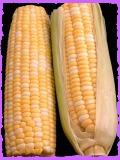Corn Allergy Guide

Corn allergy is one of the trickiest. Corn is relatively inexpensive and comes in many variations. Therefore, it is widely used in many industries.
Corn allergy occurs when the immune system treats corn components (mostly proteins) as foreign bodies and produces antibodies (Immunoglobulin E) to fight them. Visit allergies section to read more.
Allergy to corn may be contact, food or inhalant. Contact form is caused by corn-based bath oils, powders, glues, cleaning products.
Inhalant form is caused by inhaling the fumes from corn products (vegetable oil, perfumes, and hair sprays).
Food form is caused by consuming corn flour, corn sugar, corn oil, corn syrup, cornmeal or corn starch.
Corn Allergy Symptoms:
- Eczema
- Rash
- Hives
- Nasal congestion
- Difficulty breathing
- Asthma
- Swollen throat and tongue
- Migraines
- Crampy abdominal pain
- Diarrhea
- Nausea
- Vomiting
- Joint pain
- Anaphylactic shock (collapse)
Anaphylactic shock (collapse) is a very severe life-threatening allergic reaction. Symptoms develop very fast and medical assistance should be sought immediately.
Most common symptoms are swollen face and throat, hives, abdominal pain, vomiting, diarrhea, low blood pressure. First aid should be an adrenaline injection. If your baby had anaphylactic shock as a reaction to corn, analyze his/her surroundings carefully to eliminate potential triggers. Avoid corn going forward.
If your baby’s lips, tongue, face are swollen, and he/she has trouble breathing or swallowing, call 911.
Does Breastfeeding Make a Difference?
If you have a family history of allergies or if a corn allergy is suspected in your baby, breastfeeding is a must.
Our immune system treats every object that comes in contact with us as a foreign body. As our immune system matures it learns to accept most of the “foreign” bodies. So if your baby is prone to allergies, the later he/she comes in contact with a potential allergen, the better the chances that the immune system will react normally to it.
Since most corn allergies are outgrown, by breastfeeding your baby for as long as you can, you increase his/her chances of living allergy-free!
Corn allergy can be tested with a blood or a skin test. You
can also try an elimination diet if you notice allergy symptoms in you or
your baby. Try eliminating corn products for two- three weeks and see if the
symptoms go away. If they do (and they were mild), try re-introducing corn
into your diet. In cases of severe life-threatening symptoms, don’t
re-introduce the allergen. Talk to your doctor. Visit Allergy Testing section to read more.
Your doctor will probably recommend you carrying an EpiPen (an epinephrine auto-injector), if your allergic reaction is severe.
Cooking at home is very important for corn-allergic people. It is the best way to avoid corn products. Because corn comes in so many forms and shapes, it is difficult to be certain when eating out or buying ready-made meals that they are corn-free. Your best option is to buy ingredients in their most raw and natural form and cook at home.
What You Need to Know
If you or your breastfed baby is confirmed to be allergic to corn, here is what you need to know:
- Avoid every food that has the word “corn” (cornmeal, corn starch, corn syrup, etc.) anywhere on the label
- Some alcoholic beverages (ale, beer, gin, whiskey, vodka,
wine) may contain corn. Another reason to stay away from alcohol while
breastfeeding. Visit food avoidance section to read more about alcohol consumption while breastfeeding.
- Battered, bread-crumbed and coated meat and seafood dishes may contain corn
- Cereals, cakes, puddings, breads may contain cornmeal
- Grits is a corn product
- Vegetable oil may contain corn oil
- Food-thickeners (used in frostings, icings, gravies, sauces, dressings, marinades) may contain corn starch
- Corn starch is used on cooking containers, plastic bags, baking sheets to prevent food from sticking to them
- Glue contains corn starch
- Corn starch is used for starching the bedding, coating sterile gloves, in laundry
- Dextrose and glucose are corn sugar and corn syrup, respectively, used in soft drinks, gums, processed meats and fish, ice cream
- Corn sugar is present in infant formula!!!
- Check what the sugar and the vinegar you use at home are made from. Many contain corn.
- Many cold medicines, vitamins, and mineral pills contain corn derivatives
Important: If your breastfed baby is receiving a vitamin D supplement, be careful reading the label. Some contain corn oil or corn syrup. It is a tiny bit of it in every 400 units, but it is enough for someone allergic to corn. If you have Whole Foods in your area, the only corn-free vitamin D I found was there. The brand is Carlson. Check the label.
Read all the labels and look for hidden corn derivatives. Choose foods made with potato, wheat, arrowroot, buckwheat and tapioca flour.
Being corn-free while breastfeeding is tricky, but doable! Read my story here. Keep on doing an awesome breastfeeding job! Every nursing session adds to your baby’s chances of living allergy-free in future!
There are many ways to show your love and devotion to your kids and to win their trust. Breastfeeding is the most natural one.
Yours,
Viktoriya
Back to top of Corn Allergy>Food Allergies>Breastfeeding Home










